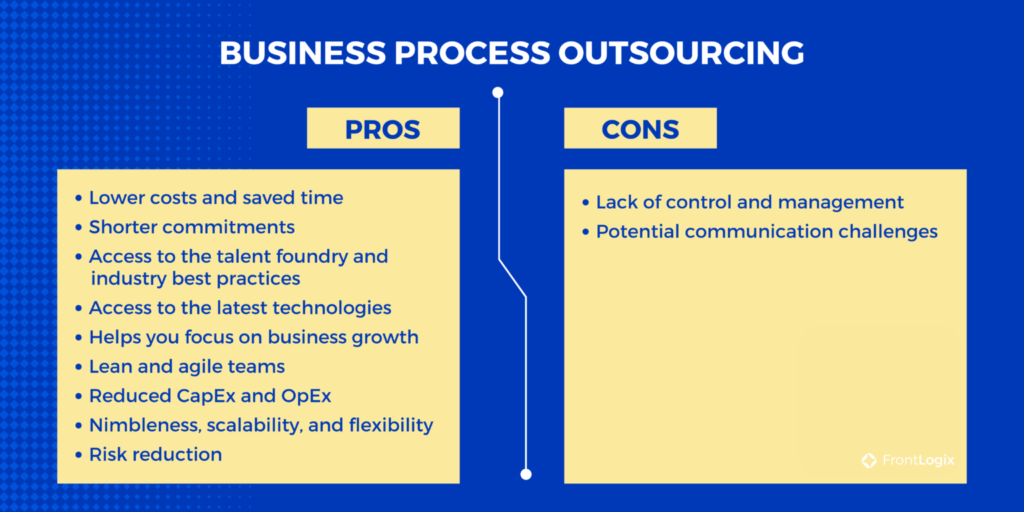Business Process Outsourcing has recently gained popularity, although it has both advantages and disadvantages. This article discusses the benefits and drawbacks of Business Process Outsourcing, ranging from lower costs to potential communication issues.
Jump to:
What is Business Process Outsourcing (BPO), and how does it work?
9 pros of Business Process Outsourcing (BPO)
2 cons of Business Process Outsourcing (BPO)
What is Business Process Outsourcing (BPO), and how does it work?
In simple terms, Business Process Outsourcing is the practice of hiring an outside company to handle certain business processes instead of a dedicated in-house team.
Having a dedicated in-house team ‒ or in-sourcing processes ‒ involves having the work performed within the organization’s operational structure by dedicated specialized teams for each business process.
That implies either hiring and training new staff or increasing the workload of existing staff members. On the other hand, outsourcing places the operations and processes off-site, using the workforce and resources of an outside organization.
There are two main reasons companies decide to outsource their business operations: cost savings and strategic focus on the core aspects of the business. While there are certainly trade-offs, generally, when activities are outsourced, the overall efficiency and productivity of the company can be significantly improved.
Now let’s review what are the pros and cons of Business Process Outsourcing.
What are the 9 pros of Business Process Outsourcing (BPO)
1. Lower costs and saved time
Lower costs are the most significant factor companies consider when choosing between in-house and outsourcing operations. When considering office setup, infrastructure costs, the burden of hiring, and paying in-house salaries and benefits, outsourcing is almost always less costly.
This is because wages and the cost of living in other countries can be much cheaper than in developed countries, allowing corporations to pay workers in such countries less while still providing them with an acceptable standard of living.
Imagine you need to build a website, some software, or a mobile app. This is the IT team you’ll need to assemble and the resources you’ll need to build in-house:

- Team of designers (graphic & UI/UX)
- Team of developers (frontend & backend)
- Quality Assurance Testers & QA Software
- Project Manager
- Workplace infrastructure (office utilities, hardware, and software)
On the other hand, if you’re outsourcing, simply hire a Business Process Outsourcing (BPO) company to do all of this for you.
[Find out: how to choose the right BPO partner]
Or here’s another example: Let’s say you already have a product and need to take care of the users. This is the Customer Success team you’ll need to acquire and the resources you’ll need to have:
- Onboarding Specialist
- Call Agent
- Experienced Customer Success Manager
- CRM software/system
- Data Analyst/Manager
- Workplace infrastructure
Again, if outsourcing, you will hire a company to manage the customer interactions instead.
2. Shorter commitments
Another great benefit of Business Process Outsourcing is the ability to hire an expert without long-term commitments. This means you’ll hire on an hourly or project basis, and you will pay only for the work done. Whereas hiring an in-house team is a longer commitment bound to a fixed monthly salary plus other employee benefits.
Let’s look at another example. You may need code developed for an ongoing project. This might be a short-term (i.e., two-month) job, so there’s no point in permanently employing a new professional coder to your in-house team. Instead, you ask for a BPO company that provides software development services to hire a developer with a specific skill set required for your project. Problem solved without spending a considerable amount or signing permanent contracts.
Or let’s say your product is up and running, but customers have difficulty onboarding or have functionality questions. Finding a good customer service representative might take ages and drain your energy. Hiring a BPO company with a dynamic contact center will provide you with trained customer success agents.

3. Access to the talent foundry and industry best practices
Yet another advantage of outsourcing is that BPOs have a trained and experienced workforce which takes time to develop.
They are professionals at what they do, with years of experience in that field. It might take years for a new in-house team to be recruited, trained, and up to speed in order to reach the same level of productivity as a BPO. In fact, it takes an average of 12 months for new employees to realize their full performance potential.
In addition, BPOs may have wider talent networks of freelancers and independent contractors that can perfectly meet your needs without onboarding or training. This means you’ll have top-level talents available without going through the long recruiting process.
4. Access to the latest technologies
Why spend money on pricey equipment when you can access it for free through outsourcing? BPOs have cutting-edge technologies and equipment, giving you access to the most recent and advanced tools and systems – without making a huge investment.
Secondly, outsourcing companies have the means and experience to maintain and update these systems, which can save your company a significant amount of money.
5. Helps you focus on business growth
Peter Drucker said, “Do what you do best and outsource the rest.” The ability to concentrate on the core business functions and work that matters most to growing your business is yet another great advantage of outsourcing.
You can either decide to delegate to a BPO the nonessential work or some part of your business you lack the knowledge, workforce, or interest to excel at. You are then free to focus solely on essential business needs and accelerate the growth of your business.
[Find out What services to outsource to reach your Goals]
6. Lean and agile teams
Once you delegate all non-essential work to the BPO, you can focus on doing what you do best and on your business’s core competencies.
Outsourcing lets you free up internal resources and create an agile, lean, and cross-functional team of professionals that can carry out a project from start to finish.
Smaller teams are typically easier to manage and bond faster, leading to better communication and quick decision-making.
There is also more accountability because it is clear who is doing what. Working in a smaller team boosts individual performance and ownership, and team members can more easily adjust to changing conditions or shifting priorities.
7. Reduced CapEx and OpEx
Delegating non-essential work and building a small in-house team has another far-reaching ripple effect.
Smaller teams need less office space and less equipment. With less equipment, there are likely to be fewer maintenance costs. Smaller teams also need less cleaning and office supplies.
That in turn leads to lower costs for things like rent, utilities, and maintenance, positively affecting your capital expenditures and operating expenses.
8. Nimbleness, scalability, and flexibility
Unhappy with the output of your BPO? Changing the team or the provider is a much simpler process than the HR nightmare of restructuring, reshuffling, or a reduction in force.
Also, you are not bound to keep a team on payroll during business plateaus or during the off-season when outsourcing. And in times of increased workload, you can simply expand it.
Outsourcing offers flexibility to scale your outsourced team up or down based on need. This allows you to respond quickly to market developments.
9. Risk reduction
One of the most significant advantages of hiring a BPO is risk reduction. Recruiting can be a drain on resources and also comes with the risk of bad hires or poor cultural fits. Employees must be located, interviewed, and onboarded before their contribution is entirely known. In addition, the positions that BPOs replace are often higher-turnover jobs.
Outsourcing is contractually bound to include the scope of work, performance metrics, and budgets. Your information is protected through NDAs and confidentiality agreements. BPOs accept much of the uncertainty that comes with hiring, and you can rest easier.

STRATEGY GUIDE
6 Simple Strategies To Improve Customer Retention
Actionable insights and proven techniques to keep your customers coming back.

What are the 2 cons of Business Process Outsourcing (BPO)
1. Lack of control and management
Control and management issues are the most common concern when considering outsourcing. And it is a legitimate issue. However, if you find a reliable BPO and dedicated team who will have the knowledge, skills, and understanding of your business, you shouldn’t need to control the entire process.
A good practice is to have detailed documentation of your business and scope of work, requirements, milestones, and everything you consider essential. This will help both parties keep track of the work and help resolve issues in case something goes wrong.
However, if you prefer delegating management tasks, this will not be as efficient with a Business Process Outsourcing. In this case, an in-house Project Manager might be a more efficient solution.
2. Potential communication challenges
Communicating with an in-house or on-site team is easier than with an outsourcing company. However, in the wake of the pandemic and the adoption of remote work arrangements, that transition has already been made in many cases.
Communication issues may still arise, especially if the outsource team is located in a different time zone, doesn’t have a solid internet connection, or does not stick to the preferred communication medium.
But again, this is manageable by finding a reliable Business Process Outsourcing partner and determining the core communication channels and processes, including meeting and response times.
To make this easier for you, here is a chart that shows both pros and cons of BPO:

Takeaway
As the above information demonstrates, there are a lot of benefits to hiring a BPO company. It’s also worth mentioning that you may find long-term relationships or networks that will contribute to the success of your business.
If having a large company is important to you, you should build one. If you are focused on making an impact, however, a BPO may be your exact tool to achieve that. (BPOs can also be very beneficial to large companies as well.)
On the other hand, if you are a start-up, need to focus on funding, and cannot afford to expand the in-house team, the BPO is the right way to go.
However, a hybrid model may be the best approach. Have an in-house team for some operations, but outsource others. Or better yet, augment an existing in-house team by adding outsourced team members. This works perfectly when searching for specific talents, elusive skill sets, or varied perspectives.
At the end of the day, you need to analyze your company’s needs and goals to determine an appropriate choice that will not distract your focus from core business functions.
FrontLogix is a boutique CX BPO that offers personalized customer care solutions that are particularly suited to the client’s demands. We offer a variety of Client Services, Digital Support Services, and WFM-managed Services. With both US-based and offshore facilities, we provide high-quality service at a cost-effective price, delivering greater value to our clients.

